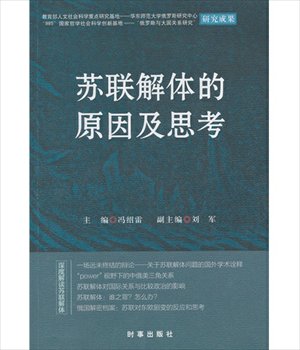HOME >> OP-ED
China still drawing political lessons from collapse of Soviet ‘brother’
Source:Global Times Published: 2013-12-19 18:38:01

Feng Shaolei and Liu Jun, Dissolution of the Soviet Union: Reasons and Thoughts, Current Affairs Press, November, 2013
Over 20 years have passed since the dramatic collapse of the Soviet Union. The fall of the once biggest communist nation not only embodies the end of the Cold War, but also heralds a new academic field which is now being explored by many scholars.China is probably the last country which wants to evade this topic. As a successful reformer of communism, China keeps researching the fall of its "big brother" and hopes to draw lessons.
The latest book on this topic - Dissolution of the Soviet Union: Reasons and Thoughts, written by Feng Shaolei, dean of the School of Advanced International and Area Studies, East China Normal University, and Liu Jun, a professor at the same school, has provided some new perspectives to explore this issue.
The book has a very neat and simple structure, which is supported by two questions: Why did the Soviet Union collapse, and what effect did the end of the Cold War have on the world?
The book gives a well-structured analysis of the Soviet Union's fate from the perspective of it being an "empire," a valid angle according to Feng. From this perspective, the book gives a comprehensive landscape and comments on the once biggest communist empire in terms of domestic administration, international relations, and democratization.
The authors of the book have also raised many enlightening answers to questions relating to the former Soviet Union and the Cold War, such as why the end of the Cold War has had such different results in Europe and Asia, and why at that time, few scholars anticipated that the end of the Cold War would come so quickly and abruptly.
In terms of the long-term influence of the Soviet Union's collapse, the book expands its focus from Central Asia, the Soviet's former sphere of influence, to world politics and international relations.
This presents a more extensive image of how the post-Soviet Union era has engraved itself upon the history of the world.
Under this theme, the book even devotes a whole chapter to digging deep into the triangular relationship between China, the US and Russia after the end of the Cold War, which demonstrates the influence of the fall of the Soviet Union on the current world order.
It also devotes a couple of chapters to collecting the research results from other scholars, whose ideas make this book more convincing and readable via comparison and contrast.
In general, this book is not oriented for readers looking for a light read.
It is a serious and rigorous reading, and needs to be read with some background knowledge.
Posted in: Fresh off the Shelf, Viewpoint